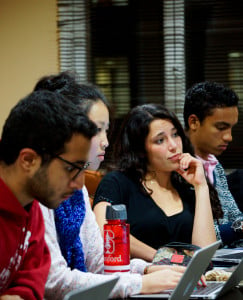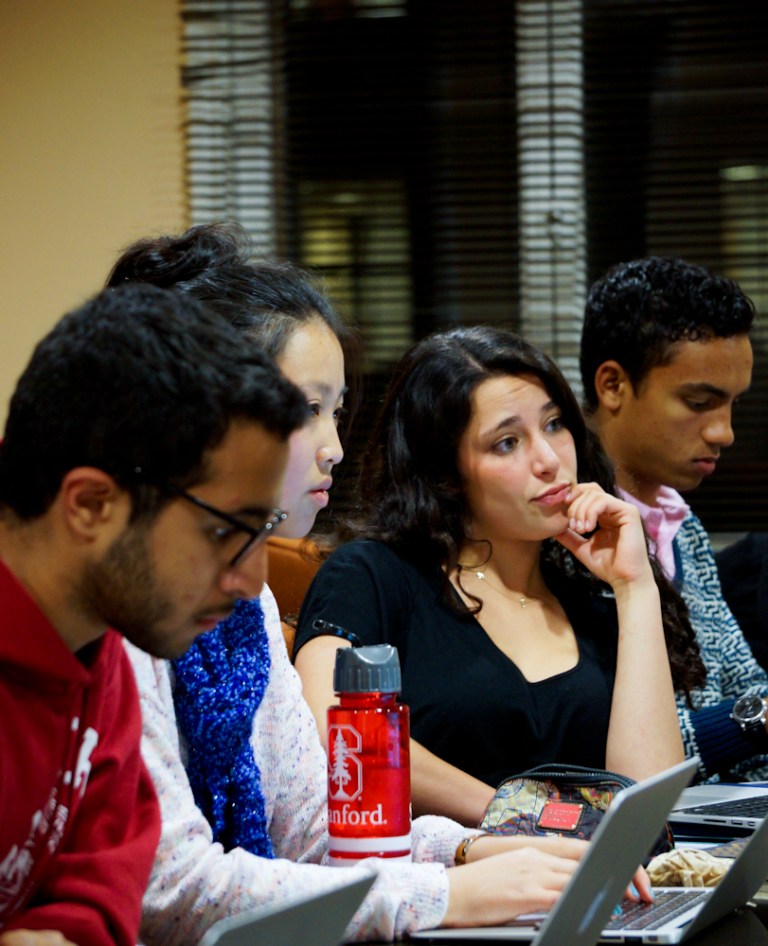
The 15th Undergraduate Senate officially began the process of substantive funding reform and also voted to formally institutionalize the Leadership Development Program in its meeting on Tuesday night.
The Senate listened to a presentation from representatives from the Student Activities Fee (SAFE) Reform group, spearheaded by Olivia Moore ’16 and Justine Moore ’16.
SAFE Reform proposed a complete overhaul of the funding system for the ASSU, including a restructuring of how money is distributed and a lowering of the student activities fee.
“Stanford currently has the highest student activities fee in the country, paying more in one year than our peers at Harvard do over their entire four years,” Olivia Moore said.
In addition to a much higher student activities fee – Stanford’s fee is currently little over $420 a year – the group also highlighted the general complexity of the current funding system, noting the several different types of fee groups.
“I think they have come up with, in general, a really great proposal,” Senate Chair Ben Holston ’15 said.
The group also called for the creation of a funding board that will ensure financially experienced members of the student community have a say in the distribution of funds, noting that close to 25 percent of funds collected from the students are not spent during the year.
“I support the reform because I think it helps resolve some of the major issues we have,” Appropriations Chair Angela Zhang ’16 said. “It is infeasible for Special Fees groups to have such huge reserves and have all that money sitting around doing nothing. It is not benefitting the students it is meant to help.”
The SAFE Reform group plans to continue to refine its proposal through conversations with community leaders. Any reform would most likely occur in the form of a constitutional amendment, which would require a student vote.
The Senate also formalized the Leadership Development Program (LDP), which has existed in some form for several years. The LDP, headed by Deputy Chair Anna Breed ’16, acts as an internship program for the Senate.
“We will have [associates] go through meetings with different administrators or help us on specific projects,” Breed said.
After being accepted into the program, each associate is assigned to a different Senate committee.
“Not only are the associates helping us with our projects, they are also learning the ins and outs of Senate and learning more about the University as a whole,” Breed said.
The LDP has also acted as a feeder for the Senate, with four of this year’s senators having served as an associate in the LDP last year.
The Senate also received an update from Senator John-Lancaster Finley ’16 about the progress made by the Joint Committee on Judicial Affairs regarding the Board of Judicial Affairs bylaws that were recently overturned by the Graduate Student Council. According to Finley, the Committee will compile a list of recommendations regarding the overturned bylaws by the end of the quarter.
The Senate also heard from the students who have been nominated for the Nominations Committee, which is the body that is responsible for interviewing and nominating students to various University committees.
“We really need great students to be representatives on the boards of the Nominations Committee is appointing,” Holston said. “I really like the people the selection committee picked and it was great to have them at the meeting and get to talk to them.”
The Senate will vote next week on the bill to appoint the nominees.
In addition, the Senate passed three other bills. Two bills authorized senators to receive half of their yearly stipend at once, and the third appropriated funds to pay for Senate flyering expenses.
The Senate also passed $31,690.27 in funding bills.
Contact Andrew Vogeley at avogeley ‘at’ stanford.edu.
